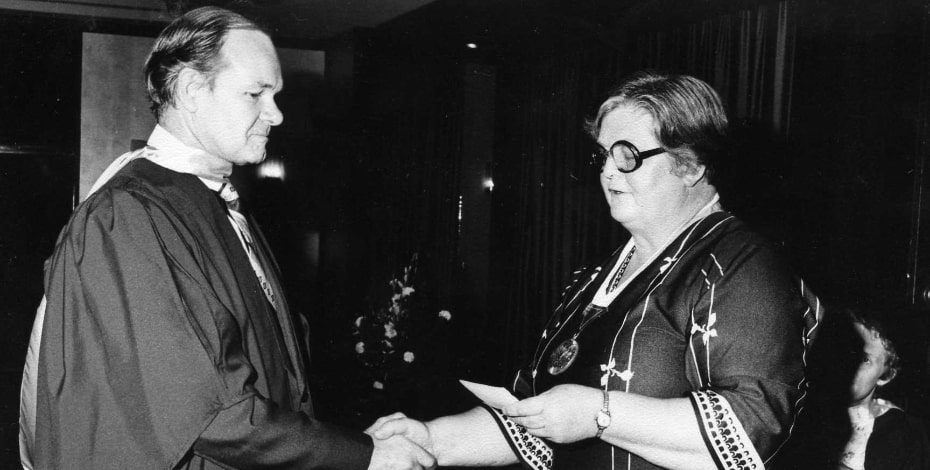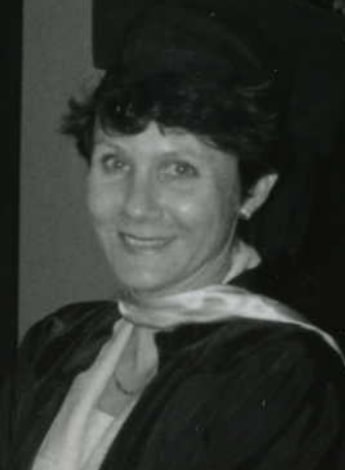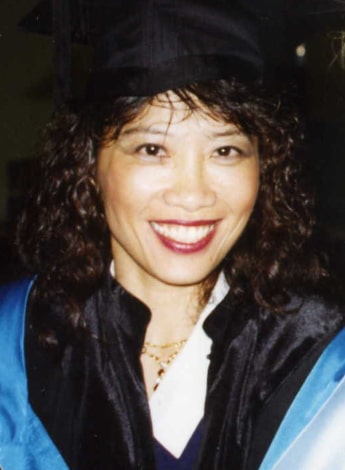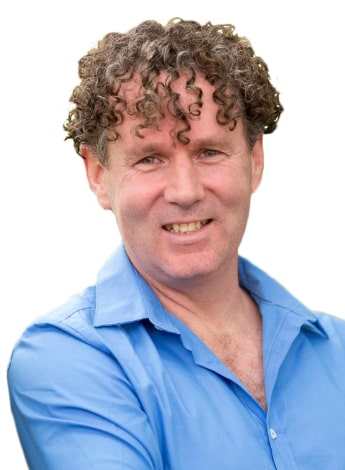
Australian College of Physiotherapists: a concise history

Part 2: Part 1 of this history provided a summary of work towards the establishment of the Australian College of Physiotherapists in 1971 and the award of the first Fellowships by Original Contribution in 1973. In this second narrative, Emeritus Professor Gwendolen Jull AO FACP and Associate Professor Patricia Trott AM FACP discuss the development of Fellowship by Specialisation and the further developments of the College in the period up to 2010.
History of the specialisation process
The need for a process by which suitably qualified clinical physiotherapists could achieve specialist status had been long in discussion.
In 1978 the APA moved a motion for specialisation at the general meeting of the World Confederation for Physical Therapy in Tel Aviv and surveyed APA members.
Members returned positive responses and saw the aims of specialisation primarily in terms of improved patient care (Cole 1983, Shepherd 1983).
The APA established a subcommittee in Queensland to continue the process (van de Meene 1978, 1988).
In 1979, it was confirmed that the College would be the body to award a Fellowship by Specialisation.
These Fellows would be entitled to be called ‘Specialists’ in their particular clinical field.
The relationship between the College and the APA was reviewed, with the outcome that the College and the APA would come together for the benefit of professional recognition and rationalisation of administrative and financial resources.
It was agreed that the College would remain a separate body under the umbrella of the APA and retain independence of thought and action (Shepherd 1983).
The College would award both Fellowships (Original Contribution and Specialisation).
Although different from each other in process, both would require a high standard of scholarship, a period for reaching the required standard and assessment by a panel of experts (Shepherd 1983).
In 1980, a committee was set up to establish the process by which specialisation would be achieved.
It was chaired by Joan Cole and contained representatives of the College, the House of Delegates, the Federal Educational Committee, a clinical physiotherapist and a member of the Queensland specialist subcommittee.
The committee completed its task in 1982.
By 1985, after a period of transmission, the College and its Board of Censors assumed complete responsibility for both Fellowships.
The original specialisation process
The specialisation process was originally developed in Cardiorespiratory Physiotherapy, Manipulative Therapy, Neurological Physiotherapy, Obstetrics and Gynaecological Physiotherapy, Paediatric Physiotherapy and Sports Physiotherapy.

Brian Edwards was awarded one of the first three Fellowships by Specialisation by the College in 1983. The initial applicants were manipulative therapists, now musculoskeletal physiotherapists.
Consideration was to be given to other fields in the future as their academic and clinical processes developed further.
It was agreed that a specialist clinician would demonstrate:
- advanced knowledge of the physiotherapy literature and its underpinning sciences
- both broad and in-depth clinical expertise in the specific field
- clinically related research
- publication of peer-reviewed papers
- academic and/or clinical teaching.
The specialisation process was developed in four stages:
Stage 1: Written and clinical examinations for entry into the process
Stage 2: An approved supervised clinical placement for two years, publications or evidence of research, clinical or academic teaching experience
Stage 3: Requirements: four 5000-word literature reviews and a one-hour oral examination. The candidate received 20 topics in preparation for Stage 4 written examinations
Stage 4: Clinical examinations: assessment and treatment of three patients over three days Written examinations: two three-hour written examinations
Exemptions were possible from one or more stages:
Stage 1: Successful completion of a one-year postgraduate coursework degree
Stage 2: Five years of clinical experience after a one-year postgraduate coursework degree in the field of specialisation
Evidence of clinical research or a research degree or two refereed papers in journals
Evidence of undergraduate or postgraduate academic and/or clinical teaching
Stage 3: There were no exemptions
Stage 4: There were no exemptions
Although the framework for the process of specialisation was conceived for all areas of physiotherapy, the postgraduate clinical coursework diplomas and degrees in the 1970s and 80s were well established in manipulative therapy and there was a natural follow-on effect.
The initial applications for the process of specialisation came from manipulative therapists (now musculoskeletal physiotherapists).
The first three applicants were exempted from Stages 1 and 2 and proceeded to the Stage 3 and Stage 4 examinations.
Australia led the physiotherapy profession internationally in the development of specialisation.
In 1983, the first Fellowships were awarded by the College.
The first Fellows by Specialisation were Geoffrey Maitland, Patricia Trott and Brian Edwards.
A further five physiotherapists successfully completed the specialisation process over the following years: Gwendolen Jull (Manipulative Therapy) in 1987, Jennifer Paratz (Cardiorespiratory Physiotherapy) in 1994, Gregory Schneider (Manipulative Therapy) in 1995, Alice Jones (Cardiorespiratory Physiotherapy) in 1997 and Peter O’Sullivan (Musculoskeletal Physiotherapy) in 2005.

Jennifer Paratz was awarded a Fellowship by Specialisation (Cardiorespiratory Physiotherapy) by the College in 1994.
The uptake of specialisation in the early years was slow, which may have been partly due to clinicians’ perceived difficulty in attaining the required high levels of scholarship, especially in research and publications; the lack of recognition of specialisation status by the physiotherapy and medical professions; a lack of appropriate structures in the health benefit funds for higher remuneration for services provided by specialists; and the absence of a career path (Carr & Shepherd 1996, APA Specialisation Committee Report 2005).
Developments from 2005
In 2005, as the number of applications for both types of Fellowship was disappointingly low, the APA Board of Directors moved to assist the College in attracting more applications.
A joint APA and College committee, chaired by APA president Cathy Nall, was formed to review the processes for attaining Fellowships by Original Contribution and Specialisation.
The APA gave financial and secretarial support for the process.
In 2007, the College logo was changed.
Fellowship by Original Contribution
With many opportunities available for physiotherapists to undertake higher research degrees, the requirements for a Fellowship by Original Contribution were changed to submission of a portfolio of published peer-reviewed papers (not used in gaining a higher degree) preceded by an introductory chapter and followed by a discussion of the work and its clinical significance.
Fellowship by Specialisation
The committee made extensive revisions and developed a titling and specialisation pathway.
APA titled members (a status attained either by a university clinical coursework master’s degree or successful completion of an APA National Group alternate pathway) were eligible to apply.
They undertook a two-year specialisation training program.
The final examinations were modified to two patient/client initial examinations with one follow-up session, and a one-hour oral examination covering the basic and applied sciences and evidence base underpinning the discipline field.
Training program
The program was designed to foster professional growth with a curriculum framework structured to address both the generic and the discipline-specific attributes of the specialist practitioner.
It was firmly grounded in adult learning principles to facilitate lifelong learning through self-directed independent study.
It aimed to articulate with other learning across a candidate’s career.

Alice Jones was awarded a Fellowship by Specialisation (Cardiorespiratory Physiotherapy) by the College in 1997.
The training program had four elements:
Element 1: Development of specialist skills in practice
Element 2: Participation in professional education
Element 3: Commitment to lifelong learning and professional development
Element 4: Participation in research activities
The training program grouped candidates (1 to 4) with a facilitator who was a Fellow of the College.
The facilitator’s role was to mentor candidates in their clinical development in the specialty field, act as an adviser to the candidate in their work to fulfil and reach the attributes of a specialist physiotherapist.
Candidates must fulfil progressive assessment requirements through the training period before presenting for the final clinical/ practical and oral examinations.
The training program was designed to train candidates in the following fields of specialty:
- Cardiorespiratory Physiotherapy
- Continence and Women’s Health
- Gerontology
- Musculoskeletal Physiotherapy
- Neurological Physiotherapy
- Occupational Health
- Paediatric Physiotherapy
- Sports Physiotherapy.
An interim period for recognition of practitioners with advanced practice
In the transition from the old to the new process of Fellowship by Specialisation (2007–10), highly experienced practitioners who were titled members of an APA National Group were given the opportunity to apply for direct entry to the College’s final practical and oral examinations.

Peter O'Sullivan was awarded a Fellowship by Specialisation (Musculoskeletal Physiotherapy) by the College in 2005.
Applicants had to provide evidence that they satisfied the following criteria: currently practising at an advanced level in a specialty field, had contributed to the professional education of others, were engaged in continuing their own professional development and were involved in research activity.
The response to the first advertisement was impressive, with more than 200 applications.
Examinations were held twice per year in the years 2007 to 2010.
Examiners were drawn from Fellows in the specialty area.
Where there were no Fellows in a particular area, the National Group supplied the names of experienced clinicians who co-examined with a Fellow from another field who was an experienced examiner.
From 2007 to 2010, 100 candidates were successful in gaining their Fellowships: Musculoskeletal Physiotherapy (42), Sports Physiotherapy (24), Continence and Women’s Health (9), Occupational Health (9), Neurological Physiotherapy (7), Cardiorespiratory Physiotherapy (5) and Paediatric Physiotherapy (4).
After this time, applicants for the process for specialisation were required to join the new process of a two-year training program.
Recognition of Specialist Fellows
The College and the APA agreed that Specialist Fellows needed to be recognised as a separate category in the new Australia-wide Registration Act and by the health funds, insurers and the Department of Veterans’ Affairs.
The APA had already made several submissions for Specialist Physiotherapists to be recognised by these health funds; however, there needed to be a critical number of Specialist Fellows before recognition would be entertained.
In 2010, the College first applied for accreditation of the training program by the Australian Physiotherapy Council.
The further development of the College from 2010 to the present time will be presented in the third narrative of the series in next month’s InMotion.
- References
Cole J (1983) Specialisation: A new reality for members of the Australian Physiotherapy
Association. Australian Journal of Physiotherapy
29(4): 144-147
Shepherd R (1983) The Australian College of Physiotherapists: A brief history. Australian Journal of Physiotherapy 29:141–143.
van de Meene L (1978) Can and should physiotherapists specialize? Australian Journal of Physiotherapy 24(2):60–62
van de Meene L (1988) Towards the effective use of the specialist physiotherapist. Australian Journal of Physiotherapy 34(2):83–87
Go to journal/physio to read these papers.
© Copyright 2024 by Australian Physiotherapy Association. All rights reserved.





